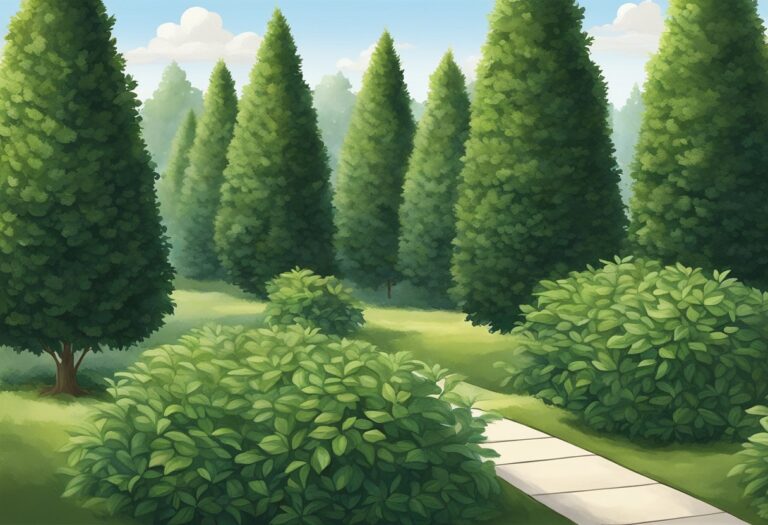10 Best Trees for Privacy: A Comprehensive Guide to Enhance Your Seclusion

A well-planned landscape can transform any outdoor space into a beautiful and private sanctuary. When choosing the best trees for privacy, consider the characteristics of each species, and how they’ll fit into your landscape design. Fast-growing trees are often preferred, as they can quickly provide the desired privacy screen. Additionally, evergreen trees, which retain their leaves year-round, are a popular choice for maintaining continuous coverage.
Planting trees for privacy not only enhances the aesthetics of a property, but also adds a natural barrier that deters noise and wind. When selecting the best trees for privacy, it’s essential to consider factors such as size at maturity, growth rate, and adaptability to local climate conditions. Moreover, it’s crucial to plan for any future maintenance that might be required, such as pruning, to ensure your trees remain healthy and continue providing the privacy you desire.
Key Takeaways
- Select trees for privacy based on growth rate, size, and adaptability to local conditions.
- Consider evergreen trees for continuous coverage and noise reduction.
- Plan for future maintenance to keep your privacy trees healthy and robust.
Understanding the Basics

When it comes to selecting the best trees for privacy, it’s important for us to understand the basic factors that play a role in creating an effective privacy screen. We will discuss some of the key aspects to consider, such as tree shape, height, size, maintenance, and their suitability for different hardiness zones.
One of the most important factors to consider is the shape of the trees we choose. Evergreen trees, for instance, are ideal for privacy as they retain their foliage throughout the year. Some popular evergreen options include cypress, yew, arborvitae, and juniper. These trees can be planted closely together to create a dense, nearly impenetrable hedge, providing year-round privacy.
Aside from evergreens, we can also consider using deciduous trees and shrubs that offer thick foliage during the growing season. Though they lose their leaves in the fall and winter, they still provide considerable privacy during the warmer months. For example, the fast-growing holly bush is known for its dense foliage, which provides excellent screening in the landscape.
The height and size of the trees we choose will largely depend on the space available in our landscape. We need to consider the mature height of the trees, as well as the space they require in terms of width and root growth. For instance, a fast-growing tree like the arborvitae can grow up to 40 feet tall, making it a great choice for taller privacy screens. On the other hand, smaller trees like the juniper can be used as a shorter fence or in tighter spaces.
Maintenance is another crucial aspect when selecting trees for privacy. To ensure an effective privacy screen, low-maintenance trees are preferred as they require less effort in trimming, pruning, and general care. Evergreen trees, like the cypress and yew, are relatively low-maintenance and seldom require much upkeep.
It’s also important for us to consider the hardiness zone of the trees we plant. Different tree species thrive in specific climates, and knowing the hardiness zone of our area can help us choose the ideal trees for the optimal growth and privacy. Various online resources can help guide our selection based on hardiness zones.
Incorporating trees for privacy also presents an opportunity to support local wildlife. By selecting native trees and shrubs, we can provide food and shelter for various birds, insects, and small mammals, enhancing the ecosystem around our landscape.
In summary, the best trees for privacy will depend on factors like tree shape, height, size, maintenance requirements, and suitability for hardiness zones. By carefully considering these aspects, we can create an effective privacy screen to enhance the beauty and functionality of our landscape without sacrificing its environmental value.
Choosing the Best Trees for Privacy
When it comes to providing privacy in your garden, selecting the right trees is essential. In this section, we will explore the best trees for privacy, dividing them into evergreen choices, deciduous options, and additional special considerations.
Evergreen Choices
Evergreen trees are known for their ability to retain their leaves throughout the year, providing you with constant coverage and seclusion. Some of the best selections include:
- Leyland Cypress: This fast-growing tree can reach a mature height of up to 60 feet. It’s low-maintenance and adapts well to various soil conditions, making it a popular choice for privacy screens.
- Italian Cypress: Another fast-growing option, this slender tree can reach up to 40 feet in height. Its narrow, columnar form creates an effective privacy barrier while taking up minimal space.
- American Holly: This broadleaf evergreen tree can reach a height of 20-30 feet and adds an ornamental touch to your landscape with its red berries and glossy leaves.
- Eastern Red Cedar: A low-maintenance, drought-tolerant conifer that grows 40-50 feet in height and adapts well to various soil types.
- Green Giant Arborvitae: This evergreen is known for its pyramidal shape and reaches up to 60 feet in height. It’s cold-hardy, low maintenance, and resistant to pests.
Deciduous Options
While deciduous trees lose their foliage in the winter, they can still provide valuable privacy during the warmer months. Some top options include:
- Lilac: This deciduous tree not only offers privacy but also produces stunning, fragrant blooms in the spring. It can reach a height of 10-15 feet, making it perfect for smaller spaces.
- Dogwood: This tree reaches a height of 20-30 feet and offers year-round appeal with its beautiful white flowers in the spring and vibrant fall foliage.
- Cherry Laurel: A versatile, evergreen tree that is perfect for hedges and privacy screens. It’s dense, produces white flowers in spring, and can reach heights of 30 feet.
- Weeping Willow: Growing to heights of up to 40 feet, this deciduous tree can quickly provide privacy as well as an elegant presence in your garden.
Special Considerations
In addition to evergreen and deciduous trees, you may want to consider the following options:
- Bamboo: This fast-growing grass can add an exotic touch to your landscape while providing instant privacy. However, be cautious when planting as it can become invasive.
- Boxwood: This low-growing evergreen shrub can be used to create a dense, formal hedge. It requires regular pruning to maintain its shape and can reach heights of up to 20 feet if left unpruned.
- Rhododendron: A cold-hardy, broadleaf evergreen with large, showy flowers, Rhododendron can create an attractive privacy screen.
Remember, when selecting privacy trees, it’s important to consider the mature height, maintenance requirements, and local climate to ensure successful growth and effective protection. With proper care and consideration of your desired level of seclusion, our suggested tree options will help you create an inviting and private outdoor space.



